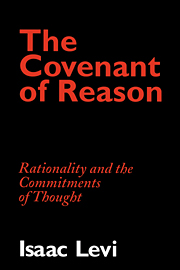Book contents
- Frontmatter
- Contents
- Introduction
- 1 Rationality and commitment
- 2 Rationality, prediction, and autonomous choice
- 3 The logic of full belief
- 4 Consequentialism and sequential choice
- 5 Prediction, deliberation, and correlated equilibrium
- 6 On indeterminate probabilities
- 7 Consensus as shared agreement and outcome of inquiry
- 8 Compromising Bayesianism: A plea for indeterminacy
- 9 Pareto unanimity and consensus
- 10 The paradoxes of Allais and Ellsberg
- 11 Conflict and inquiry
- 12 The ethics of controversy
- Name Index
- Subject Index
7 - Consensus as shared agreement and outcome of inquiry
Published online by Cambridge University Press: 05 June 2012
- Frontmatter
- Contents
- Introduction
- 1 Rationality and commitment
- 2 Rationality, prediction, and autonomous choice
- 3 The logic of full belief
- 4 Consequentialism and sequential choice
- 5 Prediction, deliberation, and correlated equilibrium
- 6 On indeterminate probabilities
- 7 Consensus as shared agreement and outcome of inquiry
- 8 Compromising Bayesianism: A plea for indeterminacy
- 9 Pareto unanimity and consensus
- 10 The paradoxes of Allais and Ellsberg
- 11 Conflict and inquiry
- 12 The ethics of controversy
- Name Index
- Subject Index
Summary
When two or more agents disagree concerning what is true, concerning how likely it is that a hypothesis is true or concerning how desirable it is that a hypothesis be true, they may, of course, be prepared to rest content with the disagreement and treat each other's views with contemptuous toleration. The mere fact that someone disagrees with one's judgments is insufficient grounds for opening up one's mind. Most epistemologists forget that it is just as urgent a question to determine when we are justified in opening up our minds as it is to determine when we are justified in closing them.
Nonetheless, the context of disagreement sometimes offers good reasons for the participants initiating some sort of investigation to settle their dispute. When this is so, an early step in such a joint effort is to identify those shared agreements which might serve as the noncontroversial basis of subsequent inquiry. Once this is done, investigation may proceed relative to that background of shared agreements according to those methods acknowledged to be appropriate to the problem under consideration.
On this view of disagreement and its resolution through inquiry, the notion of consensus may be used in two quite distinct ways: (a) One can speak of that consensus of the participants at the beginning of inquiry which constitutes the background of shared agreements on which the investigation is initially grounded, (b) Sometimes inquiry of this kind may terminate with a satisfactory conclusion. We may then say that a consensus has been reached as to the outcome of inquiry.
- Type
- Chapter
- Information
- The Covenant of ReasonRationality and the Commitments of Thought, pp. 145 - 153Publisher: Cambridge University PressPrint publication year: 1997



